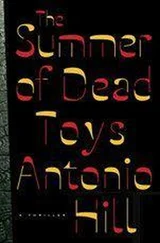Antonio Hill - The Good Suicides
Здесь есть возможность читать онлайн «Antonio Hill - The Good Suicides» весь текст электронной книги совершенно бесплатно (целиком полную версию без сокращений). В некоторых случаях можно слушать аудио, скачать через торрент в формате fb2 и присутствует краткое содержание. Жанр: Триллер, на английском языке. Описание произведения, (предисловие) а так же отзывы посетителей доступны на портале библиотеки ЛибКат.
- Название:The Good Suicides
- Автор:
- Жанр:
- Год:неизвестен
- ISBN:нет данных
- Рейтинг книги:5 / 5. Голосов: 1
-
Избранное:Добавить в избранное
- Отзывы:
-
Ваша оценка:
- 100
- 1
- 2
- 3
- 4
- 5
The Good Suicides: краткое содержание, описание и аннотация
Предлагаем к чтению аннотацию, описание, краткое содержание или предисловие (зависит от того, что написал сам автор книги «The Good Suicides»). Если вы не нашли необходимую информацию о книге — напишите в комментариях, мы постараемся отыскать её.
The Good Suicides — читать онлайн бесплатно полную книгу (весь текст) целиком
Ниже представлен текст книги, разбитый по страницам. Система сохранения места последней прочитанной страницы, позволяет с удобством читать онлайн бесплатно книгу «The Good Suicides», без необходимости каждый раз заново искать на чём Вы остановились. Поставьте закладку, и сможете в любой момент перейти на страницу, на которой закончили чтение.
Интервал:
Закладка:
“I thought the case was no longer in your hands.”
Héctor smiled.
“It’s in my head.”
“Do me a favor.” That was always the prelude to the end. “From now until the next session try to concentrate, at least for a while every day, on what you have. Good or bad, but what your life is made up of; not what’s missing.”
It was almost two in the morning, and Héctor knew he wouldn’t go back to sleep. He took his cigarette and cell phone and left the house to go up to the roof terrace. At least up there he wouldn’t wake Guillermo. The therapist was right in three things. One, he should start taking the damn sleeping pills, even if it annoyed him. Two, the case was no longer in his hands. And three, yes, deep down within him there was the conviction that Ruth was dead. Because of him.
It was a nice night. One of those nights that could reconcile you to the world if you let it. The coastline of the city extended before his eyes, and there was something in the bright twinkling lights of the buildings, in that dark but tranquil sea, that managed to chase off the demons Héctor carried within him. Standing there, surrounded by planters with dry plants, Inspector Salgado asked himself, with complete honesty, what he had.
Guillermo. His work as an inspector in Catalonia’s police force, the Mossos , simultaneously intense and frustrating. A brain that seemed to function correctly and lungs that must be half black by now. Carmen, his neighbor, his landlady; his Barcelona mother, as she said. This roof terrace from which he could see the sea. An annoying therapist who made him think about bullshit at three in the morning. Few friends, but good ones. An immense collection of films. A body capable of running six kilometers three times a week (despite lungs worn out by the damned tobacco). What else did he have? Nightmares. Memories with Ruth. The void without Ruth. Not knowing what had happened to her was a betrayal of everything that mattered to him: his promises from another time, his son, even his work. This rented apartment where they had both lived, loved and fought; the apartment she had left to begin a new life in which he was only a supporting actor. Even so, she loved him. They continued loving each other, but in another way. He was learning to live with all this when Ruth disappeared, vanished, leaving him alone with the feelings of guilt against which he rebelled every minute.
Enough, he told himself. I’m like the protagonist of a French film: fortysomething, self-pitying. Mediocre. One of those that spends ten minutes looking at the sea from a cliff, plagued by existential questions, only then to fall in love like an idiot with an adolescent ankle. And just after this reflection he remembered the last chat, more accurately an argument, he’d had with his colleague, Sergeant Martina Andreu, just before Christmas. The reason for the dispute was incredibly petty, but neither of the two seemed capable of putting an end to it. Until she looked at him with that insulting frankness and, without a second thought, fired point-blank: “Héctor, really, how long has it been since you had a fuck?”
Before his pathetic response could reverberate in his head, his cell phone rang.
2
Plaça Urquinaona was bathed in the blue light of the patrol cars, to the surprise of the four beggars, pickled with alcohol, who usually used the wooden benches as mattresses and couldn’t sleep that night.
Héctor identified himself and descended the metro stairs, feeling apprehensive. Suicides who chose this method to carry out their angel’s leap were more numerous than the ones covered in the media, more than were accounted for in the statistics, although not as many as urban legend suggested. Some cited the existence of “black stations,” platforms from which the number of people who decided to end their lives was disproportionately higher than normal. In any case, and to avoid what was known as the “copycat effect,” these deaths were kept from the public. Héctor had always thought, with no proof other than intuition, that these suicides were more the result of a moment of desperation than a plan laid out beforehand. In any case, the police procedure was characterized by prompt action: remove the body as soon as possible and reestablish service, although in this case, given the hour, they had more time; hide the occurrence under the alibi of an incident or breakdown during the time in which the traffic was necessarily suspended. Because of that he thought it strange that Agent Roger Fort, who was on shift that night, had bothered to call him at home in the middle of the night to inform him of what had happened.
The same Roger Fort who at this moment was looking with a hesitant expression at Inspector Salgado as he descended the second flight of steps that led to the platform.
“Inspector. I’m glad to see you. I hope I didn’t wake you.”
There was something about this boy, a respectful formality that Héctor appreciated yet distrusted at the same time. In any case, Fort was the most improbable replacement for the young, determined and shameless Leire Castro. Héctor was convinced that the last thing that would have occurred to Agent Castro in these circumstances was to call a superior: without a doubt she would have felt herself qualified to deal with it on her own. That was the only objection Héctor had about her work: Leire was incapable of waiting for others to reach their conclusions; she went ahead and acted of her own accord without asking permission. This was a trait that wasn’t always looked on favorably in a job where order and discipline were still considered synonymous with efficiency.
But, much to his regret, Castro was on maternity leave and Superintendent Savall had put this agent, recently arrived from Lleida, on the team. Dark, with a permanent five o’clock shadow that persisted despite shaving, average height and with a rugby player’s complexion; his surname, Catalan for “strong,” seemed to fit him perfectly. Like Leire, he was not yet thirty. Both belonged to the new crop of investigative agents filling the Mossos d’Esquadra with guys who seemed to Salgado too young. Maybe because at forty-three he sometimes felt like an old man of seventy.
“You didn’t wake me. But I’m not sure if I’m happy you called.”
Fort, somewhat disconcerted by this answer, flushed. “The corpse is already covered and it’s being taken away, as ordered …”
“Wait.” Salgado hated the official terminology, usually the fallback of incompetents when they don’t know what to say. And then he repeated something said to him when he started, a phrase that had gained meaning over the years. “This isn’t a ten o’clock series. ‘The corpse’ is a person.”
Fort nodded and his cheeks became a more intense red.
“Yes, it’s a woman. Between thirty and forty. They are looking for her bag.”
“Did she jump onto the tracks with it?”
The agent didn’t answer the question and stuck to his script.
“I want you to see the images. The metro CCTV recorded part of what happened.”
The sound of voices proceeding from the platform below made it clear something was happening.
“Who else is down there?”
“Two boys. The patrol guys are with them.”
“Boys?” Salgado summoned up his patience, but his dissatisfaction was evident from his tone. “Didn’t you tell me on the phone that the suicide occurred a little before two? I would’ve thought you had plenty of time to take a statement from them and send them home.”
“We did. But the boys came back.”
Before Roger Fort had the chance to explain further, the security guard approached them. He was middle-aged, with bags under his eyes and a tired look.
“Agent, are you going to watch the tape now or would you prefer to take it with you?”
Читать дальшеИнтервал:
Закладка:
Похожие книги на «The Good Suicides»
Представляем Вашему вниманию похожие книги на «The Good Suicides» списком для выбора. Мы отобрали схожую по названию и смыслу литературу в надежде предоставить читателям больше вариантов отыскать новые, интересные, ещё непрочитанные произведения.
Обсуждение, отзывы о книге «The Good Suicides» и просто собственные мнения читателей. Оставьте ваши комментарии, напишите, что Вы думаете о произведении, его смысле или главных героях. Укажите что конкретно понравилось, а что нет, и почему Вы так считаете.












